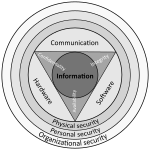Cybergeddon
Cybergeddon (from tech. cyber-, lit. "computer"; Hebrew: Megiddo, extracted from Har Megiddo ("mountain of final battle")) refers to cataclysm resulting from a large-scale sabotage of all computerized networks, systems and activities. It combines cyberterrorism, cyberwarfare, cybercrime, and hacktivism into scenarios of wide-scale internet disruption or economic collapse.[1] Economic or industrial infrastructure could be targeted, such as banks[2] or industrial control systems.[3] Since 2012, the number of Internet-based attacks and their complexity has increased.[4]
"Cybergeddon is a possibility," FireEye CEO Ashar Aziz explained in an interview with Bloomberg: "Attacks on critical infrastructures such as the power grid or financial institutions could wreak havoc not just on United States economy, but in fact, the world economy."[5]
The Defense Technical Information Center cited nuclear electromagnetic pulse attacks as a part of the military action that may bring about cybergeddon.[6]
References
[edit]- ^ Goodwin, Bill (2014-01-17). "Internet at risk of 'cybergeddon' says WEF". Computer Weekly. Retrieved 2014-07-07.
- ^ Marks, Paul (2012-06-25). "Banking outage gives tiny glimpse of cybergeddon". New Scientist. Retrieved 2014-07-07.
- ^ Chirgwin, Richard (2012-11-12). "New report warns of SCADA CYBERGEDDON*". The Register. Retrieved 2014-07-07.
- ^ "Keeping 'Cybergeddon' at bay". Business Spectator. 2012-10-31. Retrieved 2014-07-07.
- ^ "FireEye CEO Says 'Cybergeddon' Is a Possiblity [sic]: Video". Bloomberg. 2011-06-24. Retrieved 2012-11-22.
- ^ Pry, Peter (2017-07-27). "Nuclear EMP Attack Scenarios and Combined-Arms Cyber Warfare". Defense Technical Information Center. Archived from the original on March 17, 2021. Retrieved 2022-01-05.
